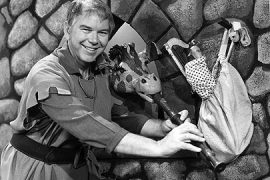I have a lot of time for Troy Reeb. Last month, when the opportunity arose to speak with the top programming executive at Corus Entertainment about Global Television’s 50th anniversary, I quickly jumped at the chance. Mr. Reeb is generally readily accessable to reporters and, as a former on-air correspondent for Global News, is articulate, knowledgeable and knows how to directly answer as well as ask questions.
We had a candid and lively conversation several weeks ago, and then it was quickly discovered that it was not recorded. I hate wasting the time of busy people, but when I requested a do-over, Reeb quickly made himself available for more.
As you will hear in this week’s podcast episode, Reeb walks me through Global’s stumble-y start early in 1974. CHCH founder Ken Sobel and, later, Niagara television executive Al Bruner, laid the ground work. Back in the late ’60s, they had promised the Broadcast Board of Governors a very robust, very Canadian service launching out of southern Ontario and quickly spreading to other parts of the country. Familiar faces such as Patrick Watson and Pierre Berton were lured under the Global tent to host shows. The start-up even showed Toronto Toros hockey from the WHA.
Trouble was, the service launched mid-season and into a recession where oil prices spiked and ad revenues dipped. Within months, the fledgling service was teetering on the verge of bancruptcy.

Among the lessons learned was that broadcasting and creating Canadian shows requires very deep pockets. The other thing was that if you were building a business dependent on ad revenue, you have to be sure to grab every last nickel — and that included the monies migrating to US border stations such as WKBW, WBEN and others in Buffalo, N.Y.
When Global launched, however, it was hamstrug by rules. Missing stations and affiliates East and West, it really was not a national service at first and had a hard time selling natinal ads. Yet for some bizarre reason it was not permitted to accept local ads.
advertisement
Fortunately, Global found a White Knight in a group led by Manitoba politician-turned-broadcaster Izzy Asper. Viewers at home were now watching TV on cable boxes where they could click through the 13 original dial channels to numbers way up in the seventies. Global was Channel 77 for a while.
More importantly, a system was developed allowing Canadian broadcasters such as CTV (still a collection of sometimes warring affiliates) and Global to acquire Americans hits and substitute commercials sold in Canada for the ones showing at the same hour on the American affiliates. This was the introduction of simulcast substitution or “Sim-Sub” in Canada. Some see it now as the Death Star. For Global, it was the Cash Cow.
That’s how Global came to be known, as Reeb reminds, as “The Love Boat network.” Later it was the Cheers, or Seinfeld or 90210 or Frasier of even The Simpsons network. Global became the home of NBC’s “Must-See” Thursday night comedy hits, among other strong imports. It was dominant in prime time in Canada throughout the ’80s and into the ’90s.
While all of the shows just mentioned were acquired long before his tenure, Reeb is quite upfront about this scheduling strategy. In business terms, it was very successful. Global also stepped up and had a popular TV news presence led by the two Peters, Desbarats and Trueman. They had strong news bureaus as well with Reeb eventually becoming part of the Queen’s Park and Ottawa bureau teams. Locally, viewers embraced Toronto’s theree “Nice Guys at Noon” — John Dawe, Mike Anscombe and Bob MacAdorey.
It is just that, for generations of Canadian writers, actors and producers, Global was an almost impossible scripted sell if you were shopping a prime time sitcom or drama. Yes, they gave an early green light to SCTV as well as to shows such as Neon Rider and Ready or Not. But ther big money was in importing Beverly Hills, 90210. Making Canadian shows casme to be seen as merely the price of obtaining a broadcast license.

The same thing, mind you, was the norm at rivals CTV or independant channels such as CHCH and Citytv. The system was tilted in favour of Canadian broadcasters not running straight into a financial brick wall, the way Global did initially. Bowing to pressure, the government initiate was in place. Buy American, substitute Canadian commercials, and make shareholders happy.
I challenged this notion over the years, especially with Barbara Williams, formerly at Global and now at CBC. Williams and Reeb, however, earned their bonuses and employed many Canadians running a business that found reward in importing hit Hollywood shows and milking them for every last nickel of ad revenue. Car dealers in Canada, department store owners, sneaker outlets, all do basically the same thing. Obtain and sell what Canadians want.
The difference, of course, is cultural impact. Telling Canadian stories became primarily left to the CBC and a few shows here and there that often times just seem like a mirror image of American shows with glimpses of the CN tower in the background. Canadian storytellers, by and large, had to try and make it stateside, an electronic brain drain that, it can be argued, has altered our essence.
All of that is way too big a subject to dig into here. Suffice to say Reeb is proud of what Corus has accomplished, Can-con wise, on Corus’s specialty channels where Brian Baeumler and others have thrived. He admires what Citytv has done this year with their immediate hit, Law & Order Toronto, and hints that Global might have something similar up its sleave.
It would be fun to have Reeb back and ask some more direct questions about Canadian content in prime time on the home network, and I’m pretty sure he would take on that challenge, anytime.
For now, however, enjoy this walk through fifty years of television memories and realize, if it wasn’t for an American show such as Survivor, Gobal, under these rules, might never have survived 50 years.






